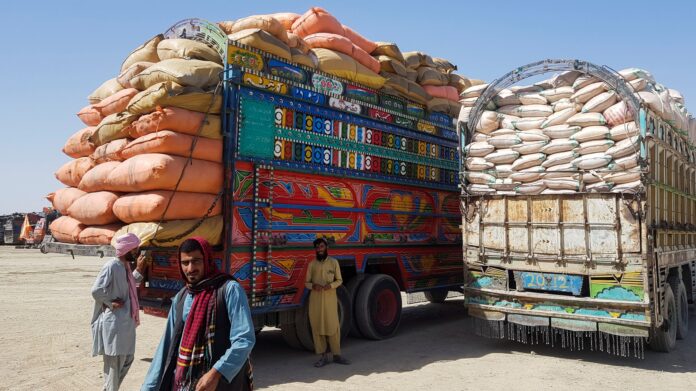Pakistan Suspends Afghan Transit Trade Amid Border Tensions as thousands of containers loaded with goods worth millions of rupees remain stranded at Karachi ports and border crossings. The indefinite suspension comes amid escalating tensions between Pakistan and Afghanistan, halting the movement of nearly 1,000 containers daily under the Afghan transit trade agreement.
According to Junaid Makda, President of the Pakistan-Afghanistan Joint Chamber of Commerce and Industry, around 291 Afghan containers are stuck at Karachi Port and Port Qasim, 500 at Chaman, 400 at Torkham, 100 at Ghulam Khan, and another 100 at Kharlachi. “Hundreds more are still onboard ships waiting to dock,” Makda said, warning that terminals are running out of storage space due to the backlog.
The Federal Board of Revenue (FBR) issued an order on Thursday suspending all gate passes for Afghan transit trade from Karachi ports. Following the directive, terminal authorities immediately offloaded Afghanistan-bound containers from transport vehicles. Customs officials confirmed that around 500 trucks — 300 at Chaman and 200 at Torkham — have also been stopped, forming long queues of stranded cargo vehicles on both sides of the border.
In Quetta, correspondents reported that the Bab-e-Dosti crossing at Chaman has remained closed for six consecutive days, suspending all trade and passenger movement. “Loaded and empty trucks are lined up on both sides, with drivers facing growing frustration,” traders said.
The Chaman Chamber of Commerce confirmed that dozens of trucks carrying edible oil, fruits, vegetables, and clothing from Pakistan to Afghanistan are stuck, while more than 200 Afghan trucks remain on the opposite side. Traders estimate losses worth millions of rupees as 130 trucks loaded with perishable fruits like grapes and pomegranates are now at risk of spoilage.
Customs authorities have also reported that containers bound for Central Asian countries via Karachi are parked near roadside hotels in Balochistan. Drivers have appealed for permission to move cleared trucks to safer areas following recent shelling incidents that damaged several vehicles.
Trade experts warn that the continued suspension of Afghan transit trade could severely disrupt supply chains, increase port congestion, and create a storage crisis in Karachi. The business community has urged the government to take swift diplomatic and administrative steps to resolve the issue before it results in larger economic losses and shortages of essential goods.
Tags:


